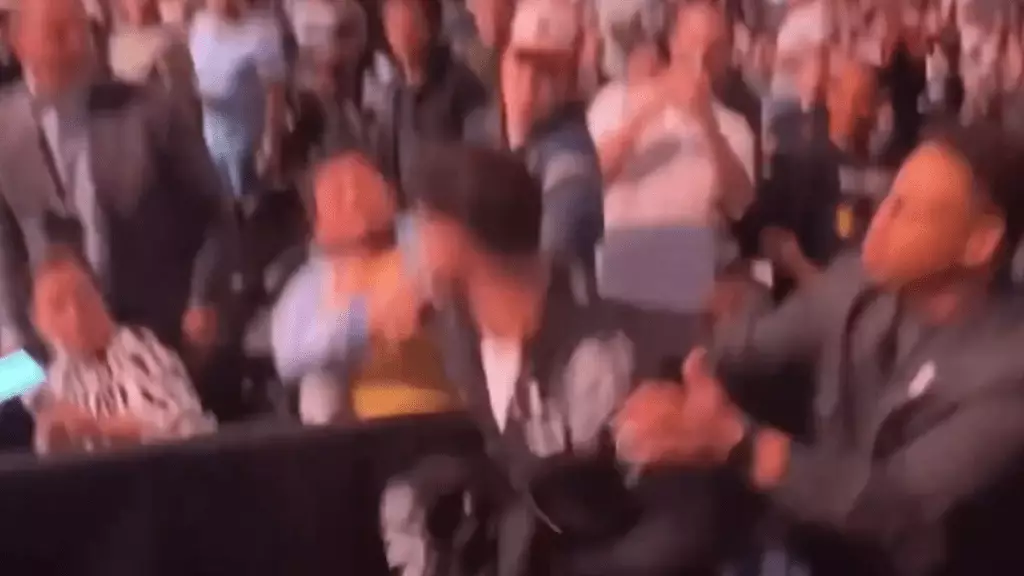The world of mixed martial arts (MMA) often finds itself intertwined with drama that extends beyond the octagon. One such episode unfolded during UFC 310, where bantamweight champion Merab Dvalishvili, alongside his close associate and fighter Dennis Buzukja, found themselves caught in an unexpected altercation involving a fan. This incident not only highlights the volatility of emotions in high-stakes situations but also raises questions about the dynamics between fighters, fans, and promotional rivalries.
The altercation took place post-fight, as Dvalishvili and Buzukja were exiting the arena after Aljamain Sterling’s unanimous decision loss to Movsar Evloev. Tensions were high, as both fighters were undoubtedly affected by the result of their teammate’s bout. As they made their way back to the locker room, the atmosphere turned electric when an individual in the crowd, later identified as Arman Tugaev, started instigating Dvalishvili. Initial reports indicated that the showdown escalated when Tugaev allegedly grabbed Dvalishvili’s arm and spoke to him provocatively in a language perceived as hostile.
What ensued was a flurry of exchanges—video footage captured the moment Dvalishvili appeared to be restrained by security personnel, while Buzukja engaged physically with Tugaev. While such face-offs are not entirely uncommon in the high-octane world of the UFC, this particular incident carries the weight of prior research into the motives behind Tugaev’s provocative actions.
Dvalishvili has publicly alleged that Tugaev’s presence was more than coincidental, suggesting that he may have been a pawn in a larger game orchestrated by Umar Nurmagomedov, a title contender with whom Dvalishvili shares a complex rivalry. This assertion raises the bar for what’s at stake in MMA—where fans may not simply be supporters but also unwitting players in the larger narrative of fighter relationships. Pictures surfaced after the event, showcasing Tugaev alongside Team Nurmagomedov, bolstering Dvalishvili’s claim that the situation may have been premeditated.
This theory indicates a potentially darker side of fan engagement, where individuals might deliberately instigate confrontations to unnerve a rival fighter. The implications could ripple across the sport, creating an environment where authenticity and sportsmanship take a back seat to calculated provocations and machinations designed to fuel personal feuds.
Dennis Buzukja, the central figure attempting to deescalate the situation, later expressed his views on The Weekly Scraps podcast. He recounted his efforts to calm Tugaev but detailed how his intentions were met with physical retaliation. Buzukja seemed both relieved and perplexed by the encounter, highlighting how an evening intended to support a friend spiraled into unexpected chaos. His admission that he was torn between de-escalation and perhaps giving in to baser instincts illustrates the mix of emotions that can overwhelm individuals in the heat of the moment.
The complexities of fighter camaraderie also come to the forefront in these discussions. In a world where emotional stakes are inherently high, the bond between fighters can put them in positions where they feel compelled to defend their teammates, irrespective of the ramifications that might follow.
With the Nevada Athletic Commission now monitoring the situation, it’s unclear whether any official disciplinary actions will emerge. UFC CEO Dana White downplayed the incident, which may signal his attempt to keep the focus on the sport rather than the missteps of its participants. This response underscores the balancing act the UFC must perform: promoting its fighters while maintaining a veneer of control over the narrative that unfolds around them.
As the dust settles from UFC 310, the incident serves as a lens into the often tumultuous world of mixed martial arts. Emotional volatility, the intricacies of fighter dynamics, and the fine line between rivalry and unnecessary provocation become clearer with each passing altercation. In a sport that thrives on spectacle, incidents like these add layers to the narrative, captivating fans and pushing the boundaries of what is considered appropriate behavior in the sphere of professional combat sports.
While it remains to be seen how this situation will evolve, one thing is certain: the world of MMA will continue to offer a potent mix of athleticism, drama, and human emotion.

